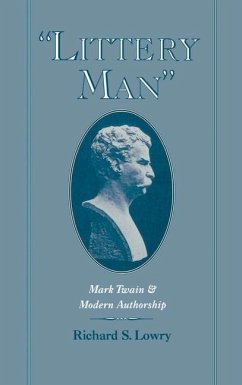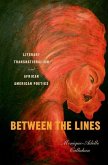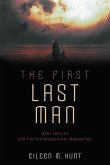As Mark Twain, Samuel Clemens became one of America's first modern celebrities, successfully straddling the conflicts between culture and commerce. Twain manipulated the cultural outlets of his day, not only through publication of his diverse novels, but through newspapers, magazines, book reviews, advertising, and his popular performances and readings. In Littery Man, Richard Lowry examines a range of Twain's major works to show how the writer strove to establish his authority over the course of his career. For Lowry, Samuel Clemens's supreme fiction and most explicitly artful performance was Mark Twain, the fiction that authorized his fiction. Lowry reconstructs that performance as the moment at which the American Writer emerged as a profession. He gives attention to the historical and cultural context of the Gilded age, from Twain's influential contemporary William Dean Howells to the various genre books that Twain consistently mastered, e.g., travel guidebooks, manuals for boys, and autobiographies. The result is that Littery Man will appeal to both Twain scholars and to scholars and students of nineteenth century American literature and culture.
A self-styled "American vandal" who pursued literary celebrity with "a mercenary eye" even as genteel America proclaimed him the American Rabelais, Samuel Clemens, as Mark Twain, straddled the conflicts between culture and commerce that characterized the era he named the Gilded Age. In "Littery Man", Richard Lowry examines how Twain used these conflicts in his major texts to fashion an "autobiography of authorship", a narrative of his own claims to literary authority at that moment when the American Writer emerged as a profession. Drawing on a wide range of cultural genres - popular boys' fiction, childrearing manuals, travel narratives, autobiography, and criticism and fiction of the period - Lowry reconstructs how Twain participated in remaking the "literary" into a powerful social category of representation. He shows how, as one of our culture's first modern celebrities, Samuel Clemens transformed his life into the artful performance we have come to know as Mark Twain, and his texts into a searching critique of modern identity in a mass-mediated society. "Littery Man" will appeal to both Twain scholars and to scholars and students of nineteenth-century American literature and culture.
Hinweis: Dieser Artikel kann nur an eine deutsche Lieferadresse ausgeliefert werden.
A self-styled "American vandal" who pursued literary celebrity with "a mercenary eye" even as genteel America proclaimed him the American Rabelais, Samuel Clemens, as Mark Twain, straddled the conflicts between culture and commerce that characterized the era he named the Gilded Age. In "Littery Man", Richard Lowry examines how Twain used these conflicts in his major texts to fashion an "autobiography of authorship", a narrative of his own claims to literary authority at that moment when the American Writer emerged as a profession. Drawing on a wide range of cultural genres - popular boys' fiction, childrearing manuals, travel narratives, autobiography, and criticism and fiction of the period - Lowry reconstructs how Twain participated in remaking the "literary" into a powerful social category of representation. He shows how, as one of our culture's first modern celebrities, Samuel Clemens transformed his life into the artful performance we have come to know as Mark Twain, and his texts into a searching critique of modern identity in a mass-mediated society. "Littery Man" will appeal to both Twain scholars and to scholars and students of nineteenth-century American literature and culture.
Hinweis: Dieser Artikel kann nur an eine deutsche Lieferadresse ausgeliefert werden.








